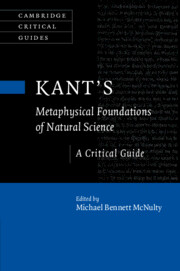Book contents
- Kant’s Metaphysical Foundations of Natural Science
- Cambridge Critical Guides
- Kant’s Metaphysical Foundations of Natural Science
- Copyright page
- Contents
- Figures
- Contributors
- Note on Abbreviations and Translations
- Introduction
- Chapter 1 Kant’s Conception of the Metaphysical Foundations of Natural Science
- Chapter 2 Kant’s Normative Conception of Natural Science
- Chapter 3 The Applicability of Mathematics as a Metaphysical Problem
- Chapter 4 Phoronomy
- Chapter 5 Space, Pure Intuition, and Laws in the Metaphysical Foundations
- Chapter 6 Finitism in the Metaphysical Foundations
- Chapter 7 The Construction of the Concept of Space-Filling
- Chapter 8 Beyond the Metaphysical Foundations of Natural Science
- Chapter 9 How Do We Transform Appearance into Experience?
- Chapter 10 Absolute Space as a Necessary Idea
- Chapter 11 Proper Natural Science and Its Role in the Critical System
- References
- Index
- Cambridge Critical Guides
Chapter 8 - Beyond the Metaphysical Foundations of Natural Science
Kant’s Empirical Physics and the General Remark to the Dynamics
Published online by Cambridge University Press: 22 October 2022
- Kant’s Metaphysical Foundations of Natural Science
- Cambridge Critical Guides
- Kant’s Metaphysical Foundations of Natural Science
- Copyright page
- Contents
- Figures
- Contributors
- Note on Abbreviations and Translations
- Introduction
- Chapter 1 Kant’s Conception of the Metaphysical Foundations of Natural Science
- Chapter 2 Kant’s Normative Conception of Natural Science
- Chapter 3 The Applicability of Mathematics as a Metaphysical Problem
- Chapter 4 Phoronomy
- Chapter 5 Space, Pure Intuition, and Laws in the Metaphysical Foundations
- Chapter 6 Finitism in the Metaphysical Foundations
- Chapter 7 The Construction of the Concept of Space-Filling
- Chapter 8 Beyond the Metaphysical Foundations of Natural Science
- Chapter 9 How Do We Transform Appearance into Experience?
- Chapter 10 Absolute Space as a Necessary Idea
- Chapter 11 Proper Natural Science and Its Role in the Critical System
- References
- Index
- Cambridge Critical Guides
Summary
The General Remark to the Dynamics (hereafter, “the Remark”), appended to the second chapter of Kant’s MAN (4:523–35), is a perplexing tract. Therein, Kant offers a quadripartite characterization of the “specific variety of matter” – that is, those properties that vary among bodies, such as density, cohesion, aggregative state, friction, elasticity, and chemical affinity – that is bookended by reflections on his preference for a force-based methodology for explaining natural phenomena, which he dubs the “metaphysical-dynamical mode of explanation” (4:525). These considerations, particularly the discussion of the specific variety of matter, appear prima facie divorced from priorities of MAN. In MAN, Kant’s primary intention is to found the a priori part of the natural science of matter, or what he elsewhere calls the “metaphysics of corporeal nature” (4:470, 472, 478) and “rational physics” (KrV, A846/B874).1 In the body of the book, he thus proffers purportedly a priori clarifications, propositions, and laws that hold universally of all matter. To wit, among other propositions, he demonstrates that matter possesses two fundamental forces, the repulsive (MAN, 4:497) and attractive forces (4:508–9); that it is infinitely divisible (4:503–4); and that action and reaction are equal and opposite in the communication of motion (4:543–7).
- Type
- Chapter
- Information
- Kant's Metaphysical Foundations of Natural ScienceA Critical Guide, pp. 178 - 196Publisher: Cambridge University PressPrint publication year: 2022
- 1
- Cited by



